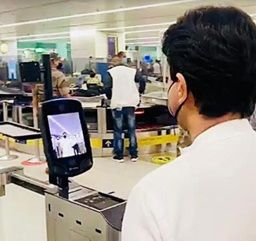IDEMIA has been selected as GMR Group’s technology partner in India’s “DigiYatra” project for airport transformation, ensuring the French IT giant’s biometric technology will have a prominent role in customer processing.
Coordinated by the country’s Aviation Ministry, DigiYatra revolves around the use of facial recognition to establish a digital ID for travellers, enabling low-friction airport screening.
IDEMIA says it has been working with the public-private consortium Delhi International Airport Limited (“DIAL”) on a Proof of Concept for the past year-and-a-half; now, thanks to its new contract with the domestic firm GMR Group, its facial recognition technology will be used not only in Delhi, but in airports in Goa and Hyderabad.
Commenting on the new contract, IDEMIA India Regional President Matthew Foxton noted the tech giant’s previous work on major projects in the country, including activities related to Aadhaar, India’s pioneering biometric national ID program.
“Over the last 27 years in the country, IDEMIA has partnered with mission-critical and digital transformation projects in India like JandhanYojna and Aadhaar program,” he said. “We are thrilled to collaborate and partner with GMR Group for DigiYatra, yet another exemplary digitization initiative of the Government of India.”
The news comes alongside another update concerning its work to provide the Lithuanian government with biometric devices and other infrastructure components to help the country comply with the European Union’s pending Entry/Exit System for border control. Lithuania’s State Border Guard Service (SBGS) has awarded the company with an “addendum contract” following last year’s agreement to have IDEMIA provide the border control equipment for the European Union’s planned Entry/Exit System (“EES”).
Noting that it has already delivered “all necessary equipment” for manual border control stations, including fingerprint and face scanners, IDEMIA has announced that the addendum contract requests additional ten-fingerprint scanners, face capture devices, passport readers, tablets, and suitcases.








